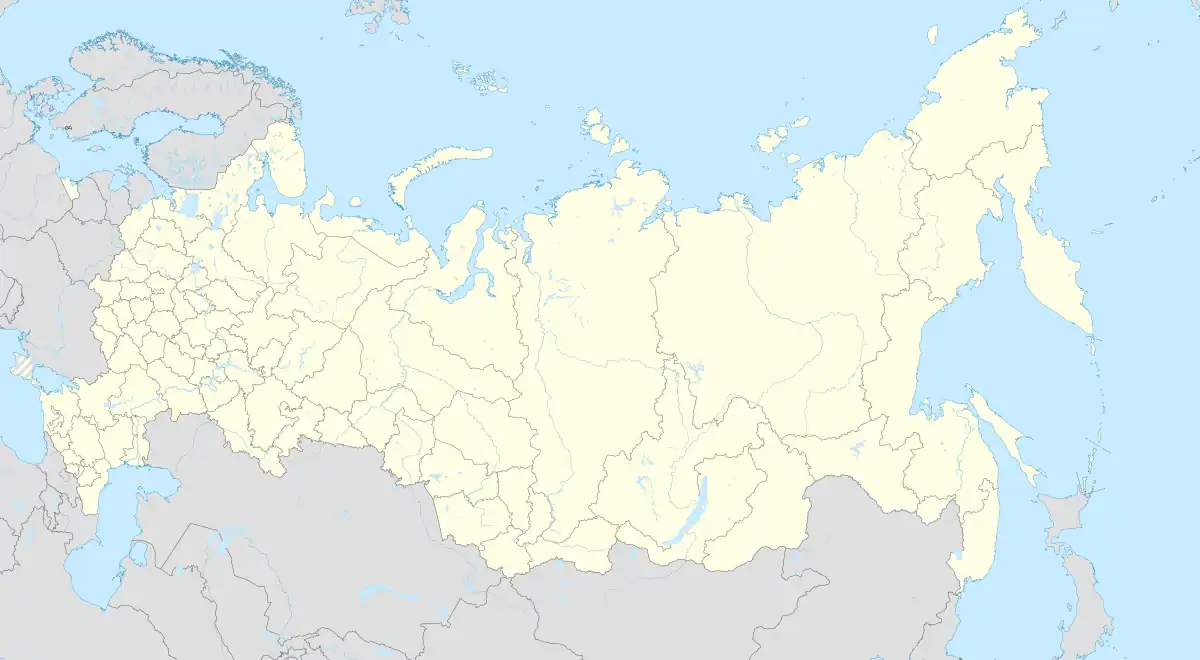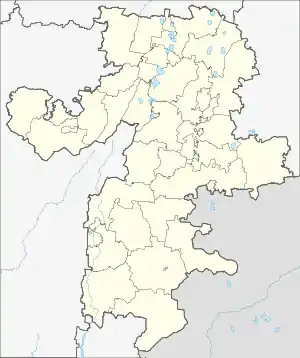Miass
Миасс | |
|---|---|
.jpg.webp) Miass in July 2011 | |
.png.webp) Flag _(2002).png.webp) Coat of arms | |
Location of Miass | |
 Miass Location of Miass  Miass Miass (Chelyabinsk Oblast) | |
| Coordinates: 55°00′N 60°06′E / 55.000°N 60.100°E | |
| Country | Russia |
| Federal subject | Chelyabinsk Oblast |
| Founded | 1773 |
| City status since | 1923 |
| Government | |
| • Head of Miassky Urban Okrug | Igor Voynov |
| Elevation | 340 m (1,120 ft) |
| Population | |
| • Total | 151,751 |
| • Estimate (2018)[2] | 151,673 (−0.1%) |
| • Rank | 115th in 2010 |
| • Subordinated to | City of Miass[3] |
| • Capital of | City of Miass[3] |
| • Urban okrug | Miassky Urban Okrug[3] |
| • Capital of | Miassky Urban Okrug[3] |
| Time zone | UTC+5 (MSK+2 |
| Postal code(s)[5] | 456300 |
| Dialing code(s) | +7 3513 |
| OKTMO ID | 75742000001 |
Miass (Russian: Миа́сс, IPA: [mʲɪˈas]) is a city in Chelyabinsk Oblast, Russia, located 96 kilometers (60 mi) west of Chelyabinsk, on the eastern slope of the Southern Ural Mountains, on the bank of the river Miass. Population: 147,995 (2021 Census);[6] 151,751 (2010 Census);[1] 158,420 (2002 Census);[7] 167,839 (1989 Census).[8]
Name
The name Miass is taken from the Bashkirs (Bashkir: Мейәс), the indigenous inhabitants of these places, with the root of the word meaning "water" or "friend".
History
It was founded in 1773 as a copper mining factory. During the 19th century, the development was driven by the discovery of the richest gold deposits in the Urals. Average annual extraction of gold from the Miass region was about 640 kilograms (1,410 lb). In the mid-19th century, the volume of gold mining went down, and the development of Miass also slowed. Town status was granted to Miass in 1923. In 1941, an automobile factory (which still operates as UralAZ) was built.
Administrative and municipal status
Within the framework of administrative divisions, it is, together with twenty-eight rural localities, incorporated as the City of Miass—an administrative unit with the status equal to that of the districts.[3] As a municipal division, the City of Miass is incorporated as Miassky Urban Okrug.[3]
Economy and education
Currently Miass is a major machinery center. The truck manufacturer UralAZ is one of its most important factories.
UralAZ
UralAZ produces multi-axle, full-drive trucks of high cross-country passability and exports 8% of the trucks. "UralAZ" was included in the rating of 200 biggest Russian companies in 2000 in volume of sales, and employs 105,000 people. It was established in 1942, when the ZiS factory was evacuated from Moscow during World War II.
The State Rocket Center
The Makeyev Rocket Design Bureau creates submarine-launched ballistic missiles. In 1955, it was moved from Zlatoust, where it was established in 1947, to Miass.
Population
Ethnic composition (2010):[9]
- Russians – 89.4%
- Bashkirs – 3.6%
- Tatars – 3.4%
- Ukrainians 1.1%
- others – 2.5%
Tourism
The old part of the city comprises 19th-century wooden houses with original balconies, jambs, and lintels. The house of the gold mine's administrator, Simonov, has also been preserved.
Lake Turgoyak is located near Miass and is a popular tourist location, with crystal clear water.
Miass has a rich mineralogical museum, as it is close to the Ilmensky Mineral conservation area.
To the East of Miass is the Ilmenskyy Zapovednik, a large protected forest. Not far into the forest, trails lead to fresh-water springs.
Gallery
 This photo was taken in a protected forest in Miass, Chelyabinsk Oblast, Russia next to a fresh-water spring. It shows Birch (Betula spp.) and Scots pine (Pinus sylvestris).
This photo was taken in a protected forest in Miass, Chelyabinsk Oblast, Russia next to a fresh-water spring. It shows Birch (Betula spp.) and Scots pine (Pinus sylvestris). The Miass pond, Proletarskaya street. November 16, 2014.
The Miass pond, Proletarskaya street. November 16, 2014. The Miass pond, Proletarskaya street. November 16, 2014.
The Miass pond, Proletarskaya street. November 16, 2014. The Miass, Proletarskaya street. November 16, 2014.
The Miass, Proletarskaya street. November 16, 2014.
References
Notes
- 1 2 Russian Federal State Statistics Service (2011). Всероссийская перепись населения 2010 года. Том 1 [2010 All-Russian Population Census, vol. 1]. Всероссийская перепись населения 2010 года [2010 All-Russia Population Census] (in Russian). Federal State Statistics Service.
- ↑ "26. Численность постоянного населения Российской Федерации по муниципальным образованиям на 1 января 2018 года". Federal State Statistics Service. Retrieved January 23, 2019.
- 1 2 3 4 5 6 Resolution #161
- ↑ "Об исчислении времени". Официальный интернет-портал правовой информации (in Russian). June 3, 2011. Retrieved January 19, 2019.
- ↑ Почта России. Информационно-вычислительный центр ОАСУ РПО. (Russian Post). Поиск объектов почтовой связи (Postal Objects Search) (in Russian)
- ↑ Russian Federal State Statistics Service. Всероссийская перепись населения 2020 года. Том 1 [2020 All-Russian Population Census, vol. 1] (XLS) (in Russian). Federal State Statistics Service.
- ↑ Russian Federal State Statistics Service (May 21, 2004). Численность населения России, субъектов Российской Федерации в составе федеральных округов, районов, городских поселений, сельских населённых пунктов – районных центров и сельских населённых пунктов с населением 3 тысячи и более человек [Population of Russia, Its Federal Districts, Federal Subjects, Districts, Urban Localities, Rural Localities—Administrative Centers, and Rural Localities with Population of Over 3,000] (XLS). Всероссийская перепись населения 2002 года [All-Russia Population Census of 2002] (in Russian).
- ↑ Всесоюзная перепись населения 1989 г. Численность наличного населения союзных и автономных республик, автономных областей и округов, краёв, областей, районов, городских поселений и сёл-райцентров [All Union Population Census of 1989: Present Population of Union and Autonomous Republics, Autonomous Oblasts and Okrugs, Krais, Oblasts, Districts, Urban Settlements, and Villages Serving as District Administrative Centers]. Всесоюзная перепись населения 1989 года [All-Union Population Census of 1989] (in Russian). Институт демографии Национального исследовательского университета: Высшая школа экономики [Institute of Demography at the National Research University: Higher School of Economics]. 1989 – via Demoscope Weekly.
- ↑ "Наиболее многочисленные национальности" (PDF). Rosstat. Archived from the original (PDF) on August 22, 2016. Retrieved October 24, 2020.
Sources
- Законодательное Собрание Челябинской области. Постановление №161 от 25 мая 2006 г. «Об утверждении перечня муниципальных образований (административно-территориальных единиц) Челябинской области и населённых пунктов, входящих в их состав», в ред. Постановления №2255 от 23 октября 2014 г. «О внесении изменений в перечень муниципальных образований (административно-территориальных единиц) Челябинской области и населённых пунктов, входящих в их состав». Вступил в силу со дня официального опубликования. Опубликован: "Южноуральская панорама", №111–112, 14 июня 2006 г. (Legislative Assembly of Chelyabinsk Oblast. Resolution #161 of November 25, 2006 On Adoption of the Registry of the Municipal Formations (Administrative-Territorial Units) of Chelyabinsk Oblast and of the Inhabited Localities They Comprise, as amended by the Resolution #2255 of October 23, 2014 On Amending the Registry of the Municipal Formations (Administrative-Territorial Units) of Chelyabinsk Oblast and of the Inhabited Localities They Comprise. Effective as of the official publication date.).
External links
- Official website of Miass (in Russian)
- Unofficial website of Miass (in Russian)